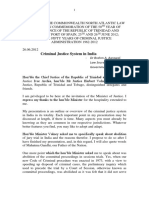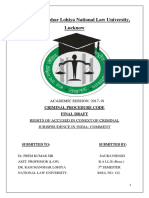Benefits of An Inquisitorial System
Benefits of An Inquisitorial System
Uploaded by
Coco NavarroCopyright:
Available Formats
Benefits of An Inquisitorial System
Benefits of An Inquisitorial System
Uploaded by
Coco NavarroOriginal Description:
Original Title
Copyright
Available Formats
Share this document
Did you find this document useful?
Is this content inappropriate?
Copyright:
Available Formats
Benefits of An Inquisitorial System
Benefits of An Inquisitorial System
Uploaded by
Coco NavarroCopyright:
Available Formats
Benefits of an Inquisitorial System Exhaustive Factual Gathering From the actual procedures followed, it can be inferred that an Inquisitorial
l system gives more primacy to attaining accurate factual evidence as opposed to adversarial systems where each side are given the privilege to disclose evidence and tell versions of stories weighted to their advantage. In the latter, a judge is given the burden to weigh sides against the other as opposed to an inquisitorial system where a judge can ask questions directly as aid in making the decision. As the prosecutor or examining judge, he can seek particular evidence, direct lines of inquiry fairly among both the prosecution and defense and interview witnesses or the parties themselves1. An Inquisitorial system is characterized by a continuous investigation conducted primarily by the police and later, more extensively by the judge or magistrate who serves as the lead investigator2. As the inquisitor, the magistrate is tasked to exhaust all efforts to settle factual uncertainties until it is determined that they have sufficient evidence of guilt3. Others (direct quote from http://www.ksl.edu.np/cpanel/pdf/adversial.pdf) 3. ADVANTAGES OF INQUISITORIAL MODE OF JUSTICE (a) The court plays substantive role in the trial to secure justice. (b) Minor error in the procedure is ignored, if the purpose of justice is solved. Procedure is not held vital, ultimate justice is regarded as the goal. (c) All the component of criminal justice system, i.e. the police, the prosecutor, the defense lawyer, the court and the accused must help to secure justice. So, the accused has no right to silence. (d) Any distortion of evidence, dubious practice followed by the accused or by the lawyers can be easily detected with the effort of the court. 4. DISADVANTAGES OF INQUISITORIAL MODE OF JUSTICE (a) Participation of the court in the inquisition of the case may lead it to biased attitude.
Law Commission of New Zealand. "Adversarial and Inquisitorial Systems: A Brief Overview of Key Features." n.d. Law Commission. 12 August 2013. <http://www.lawcom.govt.nz/sites/default/files/adversarial_and_inquisitorial_systems_2.pdf>.
2
Microsoft Encarta Encyclopedia. "Microsoft Encarta Encyclopedia." Criminal Procedure 2009. Ibid.
(b) Right to privacy of the accused is denied and that the accused is exposed to express everything which he need not express keeping in view of the merit of the case. (c) The prosecutor or the police having separate law to deal with their conduct may misuse their power and is likely to exceed their authority, which they are not entitled to. (d) Supremacy of law and equal treatment of the law for all segments of the society is not entertained
You might also like
- Essential Soft Skills for Lawyers: What They Are and How to Develop ThemFrom EverandEssential Soft Skills for Lawyers: What They Are and How to Develop ThemNo ratings yet
- Equitable Bank Vs SadacDocument1 pageEquitable Bank Vs SadacRic Laurence SaysonNo ratings yet
- TOP 105 TOPICS TO GET 85 IN REMEDIAL LAW QQRs PDFDocument27 pagesTOP 105 TOPICS TO GET 85 IN REMEDIAL LAW QQRs PDFMyles Laboria50% (2)
- Adversarial Vs Inquisitional SystemDocument9 pagesAdversarial Vs Inquisitional SystemAkshat SinhaNo ratings yet
- AI Critique On Malimath Committee On Criminal ReformsDocument104 pagesAI Critique On Malimath Committee On Criminal ReformsSiddhant LokhandeNo ratings yet
- Adversarial and Inquisitorial Legal SystemsDocument3 pagesAdversarial and Inquisitorial Legal SystemsSol-sanam QadirNo ratings yet
- Importance of ADR in Criminal JusticeDocument12 pagesImportance of ADR in Criminal JusticeHeaven DsougaNo ratings yet
- CriminologyDocument46 pagesCriminologysaif ali67% (3)
- Confession Under CRPCDocument23 pagesConfession Under CRPCMohammed ShahbazNo ratings yet
- Criminal Justice System in IndiaDocument9 pagesCriminal Justice System in IndiashamaNo ratings yet
- Trial Before Court of Session: Hidayatullah National Law University Criminal Procedure Code Project ONDocument16 pagesTrial Before Court of Session: Hidayatullah National Law University Criminal Procedure Code Project ONVikash GoelNo ratings yet
- Case Comment Joginder Kr. v. State of U.PDocument5 pagesCase Comment Joginder Kr. v. State of U.PVivek GutamNo ratings yet
- Malimath CommitteeDocument10 pagesMalimath Committeemaria_baskaran_1No ratings yet
- Criminology and PenologyDocument3 pagesCriminology and Penologyshail publicNo ratings yet
- Criminal Law 3 (State of Maharashtra V. Tapas Neogy)Document16 pagesCriminal Law 3 (State of Maharashtra V. Tapas Neogy)harsh sahuNo ratings yet
- A Critical Study On Admissibility of EvidenceDocument12 pagesA Critical Study On Admissibility of EvidenceSasmit PatilNo ratings yet
- Powers and Function and Jurisdiction of Competition Commission of IndiaDocument19 pagesPowers and Function and Jurisdiction of Competition Commission of IndiaNAMRATA BHATIANo ratings yet
- Privy Council and Hindu LawDocument14 pagesPrivy Council and Hindu LawGouri KrishnanNo ratings yet
- Role of Forensic Science in Criminal Justice SystemDocument154 pagesRole of Forensic Science in Criminal Justice SystemAumSharmaNo ratings yet
- Selvi PDFDocument24 pagesSelvi PDFChintakayala SaikrishnaNo ratings yet
- Jamia Millia Islamia: CRPC AssignmentDocument21 pagesJamia Millia Islamia: CRPC Assignmentshahbaz khanNo ratings yet
- CRPCDocument25 pagesCRPCDeepak Chauhan100% (2)
- Juvenile Delinquency, Nature, Causes and PreventionDocument6 pagesJuvenile Delinquency, Nature, Causes and Preventionyaminah raziNo ratings yet
- Case Study of Selvi V. State of Karnataka: Narcoanalysis, Beap & Polygraph Test On Legal AnvilDocument9 pagesCase Study of Selvi V. State of Karnataka: Narcoanalysis, Beap & Polygraph Test On Legal AnvilAnkur BhattNo ratings yet
- CRPC - Summary TrialDocument11 pagesCRPC - Summary TrialIshnoor Bains100% (1)
- VictimologyDocument19 pagesVictimologyJashanNo ratings yet
- White Collar Crime and Its Changing Dimensions in IndiaDocument5 pagesWhite Collar Crime and Its Changing Dimensions in IndiaAnkit GuptaNo ratings yet
- Clinical Ass. IX Sem.m Professional - Ethics - For - Lawyers - Anas MohsinDocument59 pagesClinical Ass. IX Sem.m Professional - Ethics - For - Lawyers - Anas MohsinIzaan RizviNo ratings yet
- The Prison System in India: UNIT-4Document43 pagesThe Prison System in India: UNIT-4Utkarsh AroraNo ratings yet
- Code of Civil Procedure AssignmentDocument10 pagesCode of Civil Procedure AssignmentSangeetha RoyNo ratings yet
- Project Title: Damodaram Sanjivayya National Law University Visakhapatnam, A.P., IndiaDocument22 pagesProject Title: Damodaram Sanjivayya National Law University Visakhapatnam, A.P., Indiaakhil SrinadhuNo ratings yet
- "Project - Work": Remedies in Case of Non-Registration of The FIRDocument19 pages"Project - Work": Remedies in Case of Non-Registration of The FIRgunjan singh khokharNo ratings yet
- Joseph Shine Versus Union of India JudgesDocument5 pagesJoseph Shine Versus Union of India Judgesshashank1996No ratings yet
- Criminal Justice System NotesDocument26 pagesCriminal Justice System Notesvidhipchauhan175No ratings yet
- Assignment: Offence Against Property of THEFT (Sec-378)Document12 pagesAssignment: Offence Against Property of THEFT (Sec-378)Mehvash ChoudharyNo ratings yet
- Best Bakery Case: Zahira Habibullah Sheikh v. State of GujaratDocument26 pagesBest Bakery Case: Zahira Habibullah Sheikh v. State of GujaratLoolu KuttyNo ratings yet
- Reverse Burden of Proof ArticleDocument16 pagesReverse Burden of Proof ArticleMeghan PaulNo ratings yet
- Criminology MCQsDocument4 pagesCriminology MCQsSajid Nazir100% (1)
- State Human Rights CommissionDocument10 pagesState Human Rights CommissionrajatNo ratings yet
- Jagannath Institute of Management Studies, School of Law: (Affiliated To Guru Gobind Singh Indraprastha University)Document10 pagesJagannath Institute of Management Studies, School of Law: (Affiliated To Guru Gobind Singh Indraprastha University)Harpreet ChawlaNo ratings yet
- Identification Parade AssignmentDocument10 pagesIdentification Parade AssignmentAbdul Rehman100% (1)
- Custodial Death and Inquiry by Judicial MagistrateDocument10 pagesCustodial Death and Inquiry by Judicial MagistrateSaaramsh M SNo ratings yet
- 40 Landmark Judgments: Hardly An Open-And-Shut Case, The Nature of The Crime Garnered Media AttentionDocument12 pages40 Landmark Judgments: Hardly An Open-And-Shut Case, The Nature of The Crime Garnered Media AttentionAayat 16No ratings yet
- Doctrine of Harmonious ConstructionDocument13 pagesDoctrine of Harmonious ConstructionRajdeep DuttaNo ratings yet
- Title of Dissertation Should Be Written by Students: LL.M (One Year) Degree Course Session 2019-20Document9 pagesTitle of Dissertation Should Be Written by Students: LL.M (One Year) Degree Course Session 2019-20vijyakashyapNo ratings yet
- Human Rights of An Accused Person Under PDFDocument6 pagesHuman Rights of An Accused Person Under PDFMAHANTESH GNo ratings yet
- Utility of Forensic Science in Indian Legal SystemDocument5 pagesUtility of Forensic Science in Indian Legal SystemA. L. JainNo ratings yet
- Forensic Science in IndiaDocument12 pagesForensic Science in IndiaTejinder SinghNo ratings yet
- CRPC Assignment PDFDocument17 pagesCRPC Assignment PDFAkash NarayanNo ratings yet
- Section 57 of The Indian Evidence ActDocument4 pagesSection 57 of The Indian Evidence ActActusReusJurorNo ratings yet
- National Law Institute University Bhopal: Jurisdiction of Criminal Courts in Inquiries and Trials: Section185-189Document25 pagesNational Law Institute University Bhopal: Jurisdiction of Criminal Courts in Inquiries and Trials: Section185-189rashi bakshNo ratings yet
- Iv: Crime and Criminality: Theoritical Perspectives: Early Explanations of Criminology-Schools of ThoughtDocument16 pagesIv: Crime and Criminality: Theoritical Perspectives: Early Explanations of Criminology-Schools of ThoughtSehar EjazNo ratings yet
- Rights of Accused in Conext of Criminal Jurisprudence in India: CommentDocument26 pagesRights of Accused in Conext of Criminal Jurisprudence in India: Commentsaurav singhNo ratings yet
- Determining Jurisdiction in The Cyberspace The Zippo Test or The Effects Test: Lecture 4Document2 pagesDetermining Jurisdiction in The Cyberspace The Zippo Test or The Effects Test: Lecture 4Ghazaal KhanNo ratings yet
- Professional EthicsDocument19 pagesProfessional EthicsRohit SinhaNo ratings yet
- Fast Track CourtsDocument5 pagesFast Track CourtsTejas RajgorNo ratings yet
- Interpretation ProjectDocument16 pagesInterpretation ProjectAnjali SinhaNo ratings yet
- Conceptualising Sentencing Policy in IndiaDocument19 pagesConceptualising Sentencing Policy in IndiaShahaji Law CollegeNo ratings yet
- CRPC ProjectDocument24 pagesCRPC ProjectSusmita TripathyNo ratings yet
- CR PCDocument26 pagesCR PCJyoti ChaudharyNo ratings yet
- Submission PleadingDocument30 pagesSubmission PleadingdivyavishalNo ratings yet
- National Tractor Pullers Association v. Watkins DigestDocument2 pagesNational Tractor Pullers Association v. Watkins DigestCoco Navarro100% (2)
- Iron Grip Barbell Vs USA Sports IncDocument4 pagesIron Grip Barbell Vs USA Sports IncCoco NavarroNo ratings yet
- Dominancy Vs Holistic Test: Legal Timeline in The PhilippinesDocument10 pagesDominancy Vs Holistic Test: Legal Timeline in The PhilippinesCoco NavarroNo ratings yet
- Lowell Vs Lewis Case BriefDocument3 pagesLowell Vs Lewis Case BriefCoco NavarroNo ratings yet
- Orthokinetics Inc. Vs Safety Travel Chairs: 806 F.2d 1565 (Fed. Cir. 1986)Document2 pagesOrthokinetics Inc. Vs Safety Travel Chairs: 806 F.2d 1565 (Fed. Cir. 1986)Coco NavarroNo ratings yet
- Cagayan de Oro City Landless Residents V Court of Appeals (d2017)Document1 pageCagayan de Oro City Landless Residents V Court of Appeals (d2017)Coco NavarroNo ratings yet
- San Miguel Vs Kahn - NavarroDocument1 pageSan Miguel Vs Kahn - NavarroCoco NavarroNo ratings yet
- Encarnacion V Amigo DigestDocument2 pagesEncarnacion V Amigo DigestCoco Navarro100% (2)
- Estrada Vs Escritor Case Digest - NavarroDocument1 pageEstrada Vs Escritor Case Digest - NavarroCoco Navarro100% (1)
- Criminal Law DigestsDocument15 pagesCriminal Law DigestsCoco Navarro100% (1)
- Tan Vs CA (& Singson) 1989: Article 1990-1192 (Resolutory Condition, Remedies, Effects Of, Offset Equitably)Document1 pageTan Vs CA (& Singson) 1989: Article 1990-1192 (Resolutory Condition, Remedies, Effects Of, Offset Equitably)Coco NavarroNo ratings yet
- Criminal Law Case Digests - NavarroDocument15 pagesCriminal Law Case Digests - NavarroCoco NavarroNo ratings yet
- Tan Vs CADocument2 pagesTan Vs CACoco NavarroNo ratings yet
- Tank (Contrary To Its Title, It Was A Product of Pure Artistic Genius) But It Was AlsoDocument2 pagesTank (Contrary To Its Title, It Was A Product of Pure Artistic Genius) But It Was AlsoCoco NavarroNo ratings yet
- United States v. Rafael Paulino, 4th Cir. (2011)Document7 pagesUnited States v. Rafael Paulino, 4th Cir. (2011)Scribd Government DocsNo ratings yet
- Reso On Motion To Quash MTQ BP 6 CriminalityDocument6 pagesReso On Motion To Quash MTQ BP 6 CriminalityLzl Bastes100% (2)
- Indictment Brindley ThompsonDocument40 pagesIndictment Brindley ThompsonSteve WarmbirNo ratings yet
- 81 Pinga V Heirs of SantiagoDocument29 pages81 Pinga V Heirs of SantiagogabbieseguiranNo ratings yet
- Jocelyn T Umila 118 Pennekamp To 130 WhitneyDocument7 pagesJocelyn T Umila 118 Pennekamp To 130 WhitneyRadel LlagasNo ratings yet
- Witness Summons ProformaDocument2 pagesWitness Summons ProformaVenkataSubrahmanyamVennelakantiNo ratings yet
- SC CircularsDocument65 pagesSC CircularskaiNo ratings yet
- Plaintiffs-Appellants Vs Vs Defendant-Appellee Rodolfo A. Ta-Asan Napoleon B. NideaDocument3 pagesPlaintiffs-Appellants Vs Vs Defendant-Appellee Rodolfo A. Ta-Asan Napoleon B. NideaFlorence RoseteNo ratings yet
- Housing Society Ltd. Vs Maharashtra Airport Development On 29 November 2013Document25 pagesHousing Society Ltd. Vs Maharashtra Airport Development On 29 November 2013Abhineet KaliaNo ratings yet
- United States v. Abraham Minker, Also Known As Abe Minker, 312 F.2d 632, 3rd Cir. (1963)Document6 pagesUnited States v. Abraham Minker, Also Known As Abe Minker, 312 F.2d 632, 3rd Cir. (1963)Scribd Government DocsNo ratings yet
- Ms - Shruti Vs Baldev Singh and Others On 23 May, 2017Document8 pagesMs - Shruti Vs Baldev Singh and Others On 23 May, 2017spgkumar7733No ratings yet
- The Sexual Offences Act, 2009 (Jamaica)Document40 pagesThe Sexual Offences Act, 2009 (Jamaica)L'homme ArmeNo ratings yet
- Amazon Alexa Free SpeechDocument91 pagesAmazon Alexa Free Speechjeff_roberts881100% (3)
- Clinton E Miner Guilty of Formal Charges Idaho State BarDocument14 pagesClinton E Miner Guilty of Formal Charges Idaho State BarIdaho Supreme CourtNo ratings yet
- Complaint For EjectmentDocument4 pagesComplaint For EjectmentKatherine Jane UnayNo ratings yet
- Tax Declaration As OwnershipDocument2 pagesTax Declaration As OwnershipNorhalisa SalicNo ratings yet
- Presumption of InncocenceDocument44 pagesPresumption of InncocenceAndrei CozmaNo ratings yet
- Bill of Rights ExplanationDocument23 pagesBill of Rights ExplanationLara Michelle Sanday BinudinNo ratings yet
- The Inheritance of The Common LawDocument136 pagesThe Inheritance of The Common Lawgobshiter100% (2)
- People V DramayoDocument4 pagesPeople V DramayoKennethQueRaymundoNo ratings yet
- United States v. Darrell Spencer, 4th Cir. (2013)Document4 pagesUnited States v. Darrell Spencer, 4th Cir. (2013)Scribd Government DocsNo ratings yet
- 02 (-) 19 2011 (W) PDFDocument6 pages02 (-) 19 2011 (W) PDFZamri Haji BakarNo ratings yet
- 188.marubeni Nederland B.V. vs. TensuanDocument6 pages188.marubeni Nederland B.V. vs. Tensuanvince005No ratings yet
- Sales BailmentDocument8 pagesSales BailmentMeloy ApiladoNo ratings yet
- 17 - of - 2004 Queen Vs Avondale Trumbach PDFDocument22 pages17 - of - 2004 Queen Vs Avondale Trumbach PDFdeonbzeNo ratings yet
- Court of Appeal (Organization and Administration) ActDocument13 pagesCourt of Appeal (Organization and Administration) ActRaphael MulwaNo ratings yet
- Gregorio v. CADocument2 pagesGregorio v. CAMigoy DANo ratings yet
- Provisional Remedies Cases - Rule 57Document501 pagesProvisional Remedies Cases - Rule 57Jessa Ela VelardeNo ratings yet







































































































